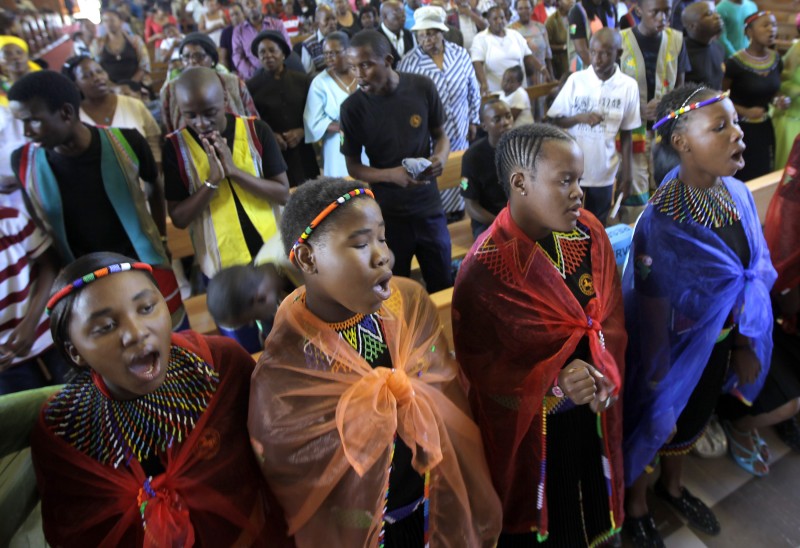It is clear that Christianity in Africa is the Christianity of the twenty first century. The African Church is young, vibrant, growing and demographically dominant. Here are some statistics:
With 171.9 million faithful, sub-Saharan Africa represents 16 percent of Catholics worldwide, a third the number in Europe and more than double that in the United States. The Democratic Republic of the Congo, at 31.2 million Catholics in 2010, has almost as many as Poland and France each, at 35.3 million and 37.9 million, respectively.
And African Catholics are on the rise. From 1910 to 2010, they went from constituting just one percent of the local population to 21 percent, making Africa the fastest growing region for the century. By comparison, Catholics in North America increased from 16 to 26 percent of the population, according to the Pew Research Center.
From 2004 to 2050, African Catholics will continue their climb, increasing by 145.8 percent to 342 million, making Africa the most Catholic continent after Latin America. Europe, meanwhile, will slump from 270 million to 255 million Catholics, at a decline of -5.5 percent by 2050. The Congo Republic that year will become the most Catholic country, with double as many faithful as will be in Poland, according to the Population Research Bureau.
But isn’t this also true of the Church in Latin America? It is also a church in the developing world: youthful, poor, hopeful… The difference is Catholics are deserting the Latin American Catholic Church in droves. The tidal wave is away from Catholicism to the Protestant sects. The reign of the first pope from Latin America has not served to stem the tide. If papal popularity is any kind of signal, Pope Francis has presided over a disastrous decline in Catholicism.
So why is African Catholicism so different from Latin American? I am not an expert on these matters by any stretch, but there are some striking differences in the development of the two continents that play a part. Latin America was colonized by the Europeans in the sixteenth and seventeenth centuries and therefore, from a theological, philosophical and cultural point of view Latin America was colonized by a European culture dominated by the culture of the enlightenment. Even the Counter-Reformation was dominated by the great theological and philosophical groundswell–although in reaction against them. In Latin America the main theological, philosophical and political influences were conditioned by European, Enlightenment assumptions and pre-suppositions. Added to this was a Hegelian (and ultimately Marxist) perspective on the world which was conflict oriented. These pre-suppositions were the foundation of modernism with it’s anti-supernatural bias, it’s revolutionary mood and it’s “progressive” assumptions.
The Latin American church is therefore largely a transplanted European manifestation–carrying into the New World the same faulty philosophical and theological tendencies. That the predominant political and economic powers were European and that the powers in Latin America itself were primarily immigrant Europeans consolidates the opinion that Latin America–despite all its geographical and cultural differences–is essentially a European offshoot. A European state with developing world distinctions. These underlying realities were the perfect breeding ground, therefore, for liberation theology. Liberation theology had all the manifestations of typical European modernism: a bias toward good works rather than a dependence on grace, a bias toward political solutions rather than spiritual, a bias toward sentimentalism and relativism rather than rationality and objective truth.
Africa, on the other hand, was developed by the colonial powers in the nineteenth century. The conversion of African Christians from their primitive religions is much more recent and direct. African Christians, if you like, leapfrogged over the European morass of enlightenment philosophy, liberalism and modernism straight into the modern world and into Christianity. As John Allen observed in his 2009 book Future Church–the African Catholic is likely to blend together an orthodox, historical, Biblical theology–fully engaged with the supernatural. He or she is likely to believe in the reality of exorcism, healing and the gifts of the Holy Spirit that are seen in charismatic style worship. The African Catholic will also be conservative in moral and family values–rejecting woke ideologies and LGBTQ agendas. At the same time, because they are persecuted, the African Catholics are likely to have an early church self awareness–that to be a Catholic might mean martyrdom. With all this, they are also aware of being the church of the poor and marginalized. They may well be critical of the economic and political muscle of the globalists and big business cartels. All of his together means the African Catholics combine a heady mixture of all that has made the Catholic Church prosper through the ages: a vibrant self-identity, an awareness of poverty, service to the poor, the need for the supernatural dimension of the faith and a youthful zeal and love for the Lord Jesus Christ and his blessed Mother–the kind of love that will transform the world.







Leave A Comment
You must be logged in to post a comment.